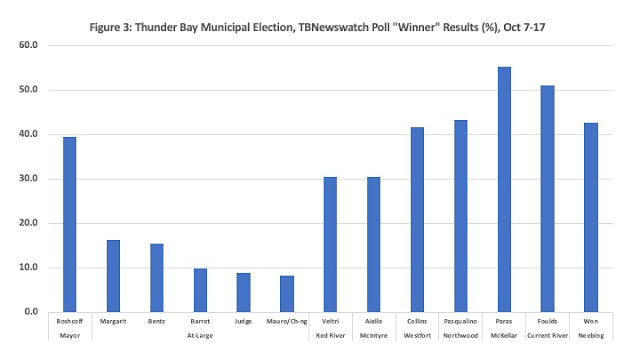The people have spoken and Thunder Bay – along with all the other municipalities in Ontario – has a new mayor and council. Congratulations to the incoming Mayor and City Council members as well as to all the candidates who put their names forward and ran. Running for office and serving as the public in an elected role is a challenging and important task and vital to the functioning of our system of government.
It was certainly an interesting evening last night not the least because of the exasperating nature of the election results. Despite our “state of the art” modern election system in Thunder Bay that combines online, phone, in-person, and drive through voting and with over one fifth of eligible ballots cast in advance, it took several hours before any meaningful results were delivered. One hopes that this process will be thoroughly reviewed because in order for the public to have confidence in their voting system, the smooth running and operation of the system sends an important signal and that was certainly lacking last evening.
As for the results, Figure 1 presents the winners as well as their percent share of votes cast. With about 35,421 votes cast (at my last tally) Ken Boshcoff emerged the winner as Mayor with 38.2 percent of the ballots cast with Gary Mack in second place with 34.3 percent of the ballots cast. The At-Large winners (with over 140,000 votes given every elector can vote for up to 5) were Mark Bentz (11%), Shelby Ch’ng (9.4%), Trevor Giertuga (8.6%), Rajni Agarwal (7.6%) and Kasey Etreni (7.2%). In terms of the Ward races, Michael Zussino took Red River with 33.4% of the vote, Albert Aiello retook McIntyre with 63.3% of the vote, Kristen Oliver held Westfort with 45.9% of the vote, Dominic Pasqualino won in Northwood with 41.6% of the vote, Brian Hamilton kept McKellar at 53.5% of the vote, Andrew Foulds kept Current River with 74.9% (a ringing endorsement one might add) and Greg Johnsen won Neebing with 36.1 percent of the vote.
Was this a change council? Not really. If you want to see the results of a "change" election you should check out Hamilton's results where three incumbents actually lost their seats and there are ten new faces on their City Council which consists of a Mayor and 15 ward councillors. In Thunder Bay with a council of twelve plus a mayor, seven of the elected councilors are incumbents (Bentz, Ch-ng, Giertuga, Aiello, Oliver, Hamilton and Foulds). If one counts Peng You as an incumbent then there was an incumbent not returned. As for the Mayor, well he has been Mayor before and a familiar face and is effectively an honorary incumbent making for eight incumbents on council. Are the other five a vote for change? At best managed change given that they probably only won because a number of incumbents chose not to run thereby making room for a few new faces. Name recognition is important in politics and in Thunder Bay given its closeted nature even more so, which is why constant calls for people to run because there is a “candidate shortage” was so amusing to observe this summer. Ward contests with more than three candidates essentially guarantee a win for incumbents and At-Large slates with upwards of 25 to 30 candidates for five positions pretty much do the same for those races. Sometimes, quality of candidate should be a more important consideration than quantity.
Will it be smooth sailing for this council? There are a lot of issues coming down the pipeline – not least of which will be policing - and one expects the honeymoon period will be short-lived especially with an anticipated major hike in property taxes being rumoured. The other interesting issue is whether or not we should reform City Council and go to a fully At-Large system of between 8 and 12 councillors plus a mayor. I would say the answer is a definite no. If one looks at the results in Figure 1, the five At-Large winners have each won with barely 10 percent of the votes cast in their favour in the At-Large competition. They can claim to “represent” the interests of the entire city, but it remains that they do not have an overwhelming mandate aside from the fact they got the biggest numbers in a ranking. The mayor’s position did somewhat better at nearly 40 percent. It is the wards where the strongest mandates have emerged. In three of the seven wards, the winners actually got a majority of the votes case, while in an additional two they were over 40 percent. I would say there if you truly wanted democracy, there is probably a better case for an all-ward system than a fully At-Large system.
One other point. Take a look at figures 2 and 3. These are the “projected” winners based on the TBNewswatch online polls that took place the weeks of August 20 to 27 and October 7 to 17. They are a mix of highly accurate projections and wildly off the mark results. In the case of the mayor’s race, the McIntyre, and Current River Wards they were consistent with the actual election results though the percentages vary quite a bit. For the At-Large race, they consistently showed Bentz as a winner but there was quite a bit of variation in the others over time. Pretty similar conclusion from the remaining ward competitions which saw quite a few flip-flops though in the case of some wards like Westfort they probably reflect the closer nature of the race. In the case of McKellar or Neebing it was either a really volatile race or well…something else perhaps given the nature of online polling.
So, to repeat, congratulations to the new mayor and council. And of course, once again the drama begins.


